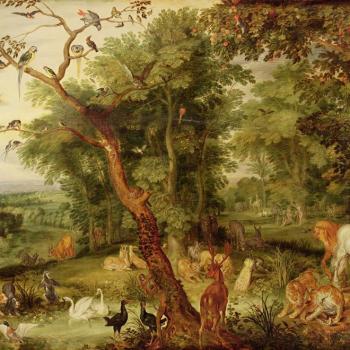Throughout the book you use the metaphor of the journey for the Christian faith, as opposed to it being an arrival. Is this word journey referring to the same thing or something different than what some refer to as the Christian walk?
In some ways we're talking about the same thing: Most Christians of whatever stripe understand at least intellectually that they are supposed to walk the walk, not just talk the talk. For conservative and progressive Christians both there's at least an awareness that Christianity is about taking up our crosses and following Jesus. There's also agreement that we are to be witnesses to the power, grace, and truth of what our encounter with Christ has done and is doing in our lives. But those things can and do mean different things to different people.
If the Christian walk is considered to be primarily about personal piety, church attendance, and evangelism of all those who don't believe as we do, then it's the precise opposite of what I want to suggest as Christian journey, because that's the faith and practice I fled. But if it is about loving our neighbors and God, about reorienting our lives toward the practice of the teachings of Christ, about letting others see God through our reoriented lives, then it's precisely what I mean. In the synoptic Gospels, Jesus sent out his disciples to do the work he had been doing; in the Gospel of John, he commanded his disciples to love as he had loved. The Christian story tells us that we are deputized to be little Jesuses, if you will, loving, feeding, healing, and praising God along the way.
Too many churches in too many denominations feel to me like private chapels, like fallout shelters. In this book I'm advocating active involvement in the world and in the lives of the broken and broken-hearted, and rejecting any suggestion that we just stand pat because we think we've got God or our own salvation worked out. That's what I mean when I talk about the journey.
You say that Christianity is not something we have accomplished, but something we do. Do you think it could also be something God does in us? What do you view as God's position in the lives of Christians on the journey?
Sure. Without getting too deep into theology-talk of justification or sanctification, I deeply believe that God reaches out to us, and, in the metaphor I use in the book, invites us to dance. We have to choose to accept that miraculous offer, but when we do, we are caught up into something more beautiful and fulfilling than we could ever have imagined or found on our own.
I'm not suggesting that we are in any way capable of our own salvation or sanctification. I'm just suggesting that faith requires a daily acceptance of God's hand, of continuing relationship. Faith shouldn't settle things once and for all; if it did, it would be like, as the novelist Marilynne Robinson said at Baylor a couple of weeks back, suggesting that the Apostle Paul's life ended when he encountered and accepted Jesus on the road to Damascus, when we know full well that what transformed the world was Paul's life from that moment of encounter onward.
You talk a lot about our selves versus ourselves. In one instance you describe sin as being the thing that separates these two selves. What do you mean by each of these two terms? Is one relating to spirit and the other to soul, or is it something different?
I resonate with this way that Paul Tillich thought of sin, as separation. Sin separates us from God, certainly; it separates us from our neighbors; it also separates us from the selves God calls us to be. When I am sunk in sin, I am thinking primarily of myself, my pleasure, my revenge, whatever sin I'm involved in. I don't know how to describe this metaphysically except to say that when I am selfish and caught up only in my own disordered desires, I cannot die to myself as I'm commanded, I cannot put my neighbors and my love for God ahead of my self, as I'm commanded, and so I simply am not living the life I'm commanded to live as a Christian. Aquinas and Augustine said that the divine law was imprinted upon human hearts, so if I don't live into or up to that law, I'm not living up to my true identity.
Although you describe the Christian faith as an ongoing journey, you also use the metaphor of being picked up and set on a new path. Do you see this as mainly a change of direction, or as more as a landmark of internal spiritual transformation by the entering in of the Holy Spirit?
Oh, I like that last phrase. Well, as I note in the book, the Greek word that's typically used in the Bible for this moment of rearrangement, however it happens, is metanoia. In metanoia, we are turning away from what is not life-giving, and turning toward that which is. Practically speaking, I suppose you'd say we are turning away from all that is Not-God in the direction of God. What you're asking seems to be if there's an ontological change such as Paul describes where the old person passes away and the new begins. I think even here I would read this as a process, rather than as a single moment in time, although I think there may indeed be a single moment of time—like the moment Anne Lamott describes in such funny and heart-breaking terms in Traveling Mercies—where we give up our attempt to do it ourselves and finally let the Spirit in.




